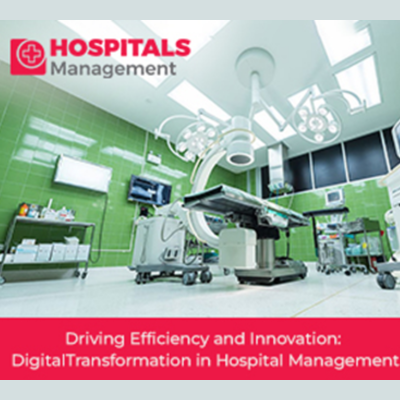Driving Efficiency and Innovation: Digital Transformation in Hospital Management

Introduction:
In the rapidly evolving landscape of healthcare, hospitals are increasingly turning to digital transformation in hospital management as a cornerstone of their strategy. This paradigm shift is reshaping how healthcare institutions operate, leveraging cutting-edge technology to enhance patient care, streamline operations, and drive overall efficiency.
Electronic Health Records (EHR): The cornerstone of this evolution hinges on the integration of Electronic Health Records (EHRs). No longer are we reliant on unwieldy paper-based records; hospitals are wholeheartedly embracing digital systems to effectively oversee patient information. This pivotal transition not only guarantees the rapid retrieval of patient data but also streamlines essential administrative functions, including billing and the processing of insurance claims.
Telemedicine and Remote Monitoring: The COVID-19 pandemic has accelerated the integration of telemedicine into hospital management, allowing medical professionals to offer virtual consultations. Telemedicine has become a lifeline for patients, enabling remote access to healthcare services. Simultaneously, remote monitoring solutions, facilitated by digital tools, empower physicians to closely observe patients' well-being from a distance.
Data Analytics and Predictive Modeling: Data analytics plays a pivotal role in the healthcare sector's digital transformation. Hospitals are leveraging big data analytics to glean insights from patient demographics, treatment outcomes, and resource allocation. The integration of predictive modeling allows hospitals to forecast patient admission rates and optimize resource allocation, ultimately resulting in cost savings and improved patient care.
Inventory and Supply Chain Management: The efficient management of medical supplies and pharmaceuticals is imperative for hospitals. Embracing digital transformation in inventory and supply chain management, hospitals can employ real-time tracking, ensuring optimal stock levels and minimizing wastage. Blockchain technology, a rising star in this arena, promises heightened transparency and security.
IoT and Wearables: Within the realm of digital transformation in hospital management, the Internet of Things (IoT) and wearable technology stand as fundamental pillars. These devices not only oversee patients' vital signs but also play a pivotal role in detecting issues early on, thereby reducing the burden on healthcare personnel. As an example, consider smart beds integrated with IoT technology, capable of detecting patient movements and sending proactive alerts to nurses, mitigating the risk of falls.
Artificial Intelligence (AI) and Machine Learning: The incorporation of Artificial Intelligence (AI) and Machine Learning is driving significant advances in medical diagnosis and treatment planning. AI-driven algorithms can swiftly analyze vast datasets, aiding healthcare professionals in delivering precise care. Machine learning models are revolutionizing medical imaging, assisting radiologists in the early detection of abnormalities. Additionally, AI-powered chatbots are becoming invaluable for hospitals by handling routine patient queries and freeing human resources for more complex tasks.
Patient Engagement and Experience: The digital transformation also extends to enhancing the patient experience. Hospitals are developing mobile apps and online platforms to facilitate appointment scheduling, grant patients access to their test results, and provide educational resources. These patient-centric tools are reshaping patient engagement and experience, fostering satisfaction and loyalty.
Compliance and Security: With the digitization of patient records and sensitive data, hospitals must prioritize data security and regulatory compliance. Rigorous cybersecurity measures and comprehensive staff training are essential for safeguarding patient information and ensuring adherence to regulations like HIPAA (Health Insurance Portability and Accountability Act).
Interoperability and Integration: A critical aspect of digital transformation in hospital management is ensuring interoperability and seamless integration of various systems. This means that electronic health records (EHRs), telemedicine platforms, and other digital tools must work together efficiently. Interoperability allows for the smooth exchange of patient data between different departments and healthcare providers, ultimately leading to more coordinated and holistic patient care.
AI-Driven Medical Diagnostics: Artificial intelligence is revolutionizing medical diagnostics, with advanced algorithms capable of highly accurate analysis of medical images like X-rays and MRIs. This breakthrough accelerates disease detection, notably in cases like cancer, while streamlining diagnosis timelines. The result? Enhanced patient well-being and lighter workloads for healthcare providers.
Robotic Process Automation (RPA) in Healthcare: Hospitals are progressively embracing Robotic Process Automation (RPA) to streamline mundane administrative duties, encompassing responsibilities like appointment scheduling, billing, and claims processing. This strategic adoption not only diminishes the potential for human errors but also liberates the workforce to channel their efforts into intricate, patient-centered tasks.
Patient Empowerment through Health Apps: Digital transformation encourages patient empowerment by providing them with health apps that enable self-monitoring and management of chronic conditions. These apps often integrate with wearable devices, allowing patients to take charge of their health and share vital data with their healthcare providers.
Enhanced Communication and Collaboration: Digital tools facilitate improved communication and collaboration among healthcare teams. Healthcare professionals can securely share patient information, discuss treatment plans, and make informed decisions in real time, ultimately leading to better patient outcomes.
Streamlined Administrative Processes: Beyond EHRs, digital transformation in hospital management extends to optimizing administrative processes. This includes automated appointment reminders, online patient registration, and electronic prescription management. Streamlining these processes improves efficiency and reduces patient wait times.
Patient Data Privacy and Consent Management: With the digitization of patient records, ensuring data privacy and consent management becomes paramount. Hospitals are implementing robust systems to protect patient information, comply with privacy regulations, and manage patient consent for data sharing and research.
Mobile Health (mHealth) for Remote Care: The rise of mobile health (mHealth) apps and devices allows for the extension of healthcare services beyond the hospital's walls. Patients can receive post-discharge care instructions, medication reminders, and even rehabilitation exercises through mobile apps, promoting continuity of care.
Data-driven Research and Innovation: Hospitals are leveraging the vast amounts of digital health data they collect for research and innovation. Data analytics and machine learning are driving groundbreaking discoveries, leading to the development of new treatments, drugs, and medical devices.
Disaster Preparedness and Response: Digital transformation enhances a hospital's ability to respond to disasters, such as natural calamities or pandemics, by enabling rapid data sharing, resource allocation, and telemedicine services. This ensures that critical healthcare services can be maintained even in challenging circumstances.
Fostering Sustainability: Digital transformation can be a driving force behind a hospital's sustainability initiatives, as it reduces the reliance on paper, optimizes energy consumption, and minimizes waste. These sustainability endeavors not only contribute to environmental well-being but also yield substantial cost savings.
Conclusion:
In summary, digital transformation in hospital management encompasses a wide array of strategies and technologies that are reshaping the healthcare landscape. From improved patient care and diagnostics to streamlined administrative processes and enhanced research capabilities, hospitals are harnessing the power of digital tools to provide more efficient, patient-centric, and innovative healthcare services. Embracing these advancements is crucial for healthcare institutions looking to thrive in the ever-evolving healthcare ecosystem.



